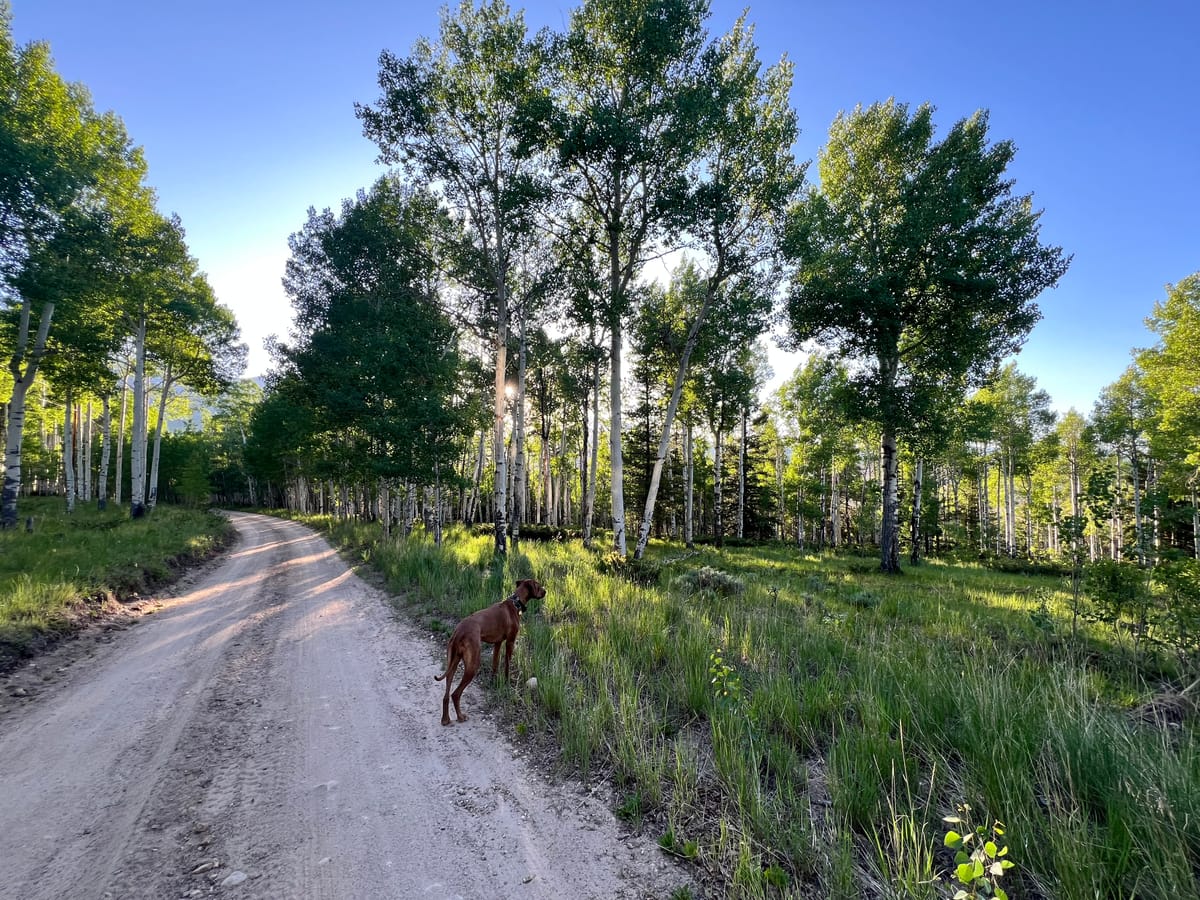
Hi everyone,
Welcome to the July edition of the Insider. Do you know someone who would enjoy the Insider? Forward this email to them, and they can subscribe here.
A vision for what is enough
I used to think of ambition as something that bloomed. It would open above me and become a space I could ascend into. It felt like those first few seconds in a cold pool. The rush of the senses. The quickening of the heart.
You can tell a lot about a person by the shape of their ambition. Is it expansive and limitless? Is it pointy and sharp? Is it sanded and rounded?
In college I had a mentor named Zach. In response to my pointy, blooming ambition to change the world, he told me one day over lunch, as the warm spring rain fell outside our Nashville diner, that the shape of his ambition was to be a husband and a father. He thought that was enough.
We struggle to know what enough looks like in our lives. There are plenty of frameworks out there for achieving and optimizing, for shaping our ambition like a long vector. But there are fewer frameworks for recognizing and practicing enough. To live with a sense of enough doesn’t mean to live without ambition. It just means ambition's shape doesn’t bloom upward into endless possibilities. Instead, it is grounded in the acceptance of constraint, the embrace of our embodied finitude.
Taste is a pendulum
In response to the smog and soot of industrializing cities, a form of art and interior design gained popularity in the late 19th century: the Aesthetic Movement. It was rooted in the appreciation of beauty and the fostering of a healthy life. Outside, a machine-driven, coal-powered industrialization chugged forward. Inside, English architects and designers, like E.W. Godwin, sought to create spaces that were psychological escapes from “high-pressure, nervous times.” Godwin linked hygiene to aesthetics, welcoming in natural light and fresh air.
Taste swings like a pendulum. It often works against the broader societal forces at the time. Industrialization gave rise to the aesthetic movement. Today the factory-farm food system has given rise to a focus on organic, local food. The proximity of our devices has summoned a nostalgia for disconnected spaces. Our digital world has made us yearn for the experiential.
It makes me wonder what pendulum swings we might encounter in an era marked by synthetic blandness, where so many of our words and our images are created by AI. Here is where the pendulum might swing:
- Human craftsmanship. Counterpositioned against the mass-produced, commodified, synthetic products all around us, we will embrace handmade craftsmanship. I already see this in the business world, where people are leaving VC-backed SaaS businesses to open bakeries, to work with wood in their shop, to apprentice under master craftsmen. In a world of scale, there will be a return to slow beauty.
- The renaissance of analog: Record players, board games, beautifully-designed puzzles, film photography. We will crave new (old) form factors. Some of my favorite newsletters reject stock images and instead choose actual, unedited photography. In a world of synthetic digital content, there will be a return to the tactile.
- The rejection of sameness: Algorithms have homogenized taste. Independent coffee shops now look the same. The explosion of global tourism has led to a Disneyification of places like Florence and Kyoto. Why travel around the world to replicate an experience everyone else is having? In a world of sameness and machinic blandness, there will be a return to the imperfect, the unvarnished, the small pockets of true originality.
- The anti-optimization life: The Zen master Hōun Jiyu-Kennett used to say that her preferred approach to teaching was not to lighten the burden of her students but to make it so heavy that they would put it down. A life defined by endless optimizing is a burden many are already putting down. In a world where AI increases the FOMO of not being productive enough or intelligent enough, people will step out of that game entirely.
The loss of grappling
One must be careful about moral panics. It's easy to overestimate the horrible, inevitable consequences of our modern times. Trains were once considered a technology that could drive people to madness and violence. Parents were once concerned that cheap, plentiful books were seducing children into a life of crime and violence. The radio was once the root of all evil; a 1941 article in The Journal of Pediatrics concluded that more than half of young children in the U.S. were severely addicted to radio and movie crime dramas. Children were consuming radio dramas “much as a chronic alcoholic does drink,” the doctor wrote.
I mention this as a caveat to what I’m about to say: I’m concerned that AI is leading to too much cognitive offloading and not enough internal grappling. In writing, there is the painstaking, meandering work of wrestling an idea onto the page. In business, the most effective strategies require serious orchestration and ruthless prioritization. They are not the work of Claude's thin insights or Cursor's verbose code. AI has created a frictionless experience of thinking, planning, coding, and creating that can tempt us to shortcut the inconvenient work of discernment. We often think of outsourcing as a benefit; one less thing on our plate, the savvy allocation of time and capital, the decision of a wise delegator. But to outsource something is to estrange ourselves from it. It is a choice to bypass a process and its related immersion, like the grappling necessary for creativity. I don’t think AI will make us dumber, but it might make us more of the same.
Can you help?
I’m building a small lifestyle business that produces premium newsletters. It’s a business rooted in craftsmanship, with a focus on making newsletters an artform. We’re hiring human writers who write in human ways. Their craft is informed not through cognitive offloading but through the crisp prose that only comes through grappling. Do you know someone?
If you’re looking to resonate with your audience and want to build trust through a premium newsletter, I’d love to chat. We’re now accepting clients to kick off in the fall.
What I am reading
- The costs of “compression culture.” Why we should be concerned about the death of nuance. Learning-Loving Meaning-Making Substack.
- Men have stopped reading fiction. What is lost and the campaign to bring them back. The New York Times.
- To save nature, we must make it sacred. The key to protecting Earth’s most vulnerable ecosystems may lie in the human capacity to treat certain places as sacred. Noema Magazine.
- Is AI making us dumber? Against the theory of brain damage. One Useful Thing Substack.
- How to be a good micromanager. Micromanagement gets a bad wrap, but there is value in being “microinterested.” First Round Review.
- Podcast: Should we be more religious? The Ezra Klein Show.
Something personal
We said goodbye to our dog Emma a few weeks ago. It was too soon. She was still young, still spry, a Rhodesian Ridgeback who, by most indicators, should have been promised many more days ahead. And yet a neurological disease was quietly running its course.
We tell ourselves there is mercy in the decision to put her down. That we are exchanging suffering for peace. That we are trading out a longer life that would be both tormented by invisible demons and dulled by the effects of painkilling drugs for a shorter one with many snacks and hugs and sniffs and back rubs. We knew this day was coming, so we gave her the best last few weeks of her life. Your dog would have been jealous of the times we had.
Compared to ours, the lives of our dogs are so short. Their entire life becomes a chapter in our own. By the dogs that stood beside us, we are able to trace the arc of our own lives, the opening and closing of our own chapters.
“This dog got me through this season of loss,” we tell ourselves. “This dog was by my side as I fell in love,” we remember. “This dog was with me when we moved across the country and into the unknown,” we recall. “This dog brought me to you,” we tell our person, holding them close.
Our dogs accompany us as we go about our wandering in the desert. And then, one day, we arrive on the banks of our Jordan River and see that promised land for which we searched all this time. And it is then, and only then, that we might realize that our dog will not be joining us as we step into whatever beauty awaits us on the other side.
This is a particular kind of heartbreak. A kind of devastating openness to the mysteries of this world. It is the dawning recognition that sometimes our dogs, who have faithfully followed at our feet, don’t get to walk with us into the next chapter that they have been quietly, knowingly preparing us for all along.
The only thing you can do is to look back and salute them as they stand watching on that distant shore, hoping we will meet again one day. To Emma ♥️

